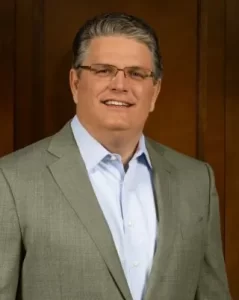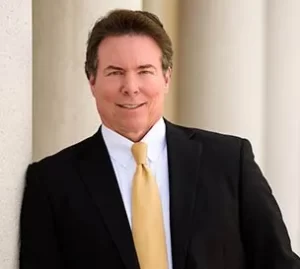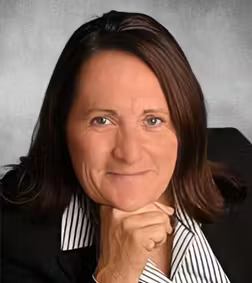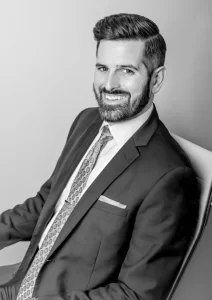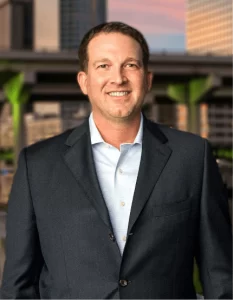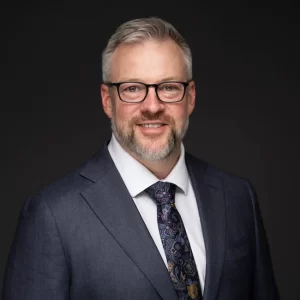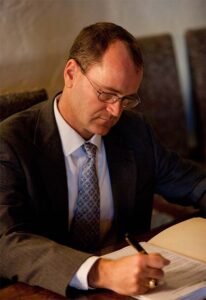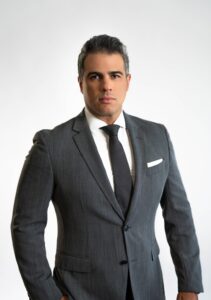Best Criminal Lawyer in Tampa
Keith Ligori
Criminal Lawyer
Keith Ligori was born and raised in Tampa, Florida. He has a bachelor’s degree in Sports Administration and a Juris Doctor from Nova Southeastern University Law School. Through his various roles in the corporate and legal world, Keith gained a well-rounded understanding of customer service and the law. It is his experience and dedication to attaining the best results for clients that has led to a fulfilling career in personal injury law. Keith opened his own practice in July of 2003. His team of lawyers and support staff strive to help people and change their lives for the better.
Keith attended Jesuit High School and was part of the class of 1988. He went on to attend Loras College and played football. He graduated in 1992. Later, Keith enrolled at Nova Southeastern University Law School, earning his J.D. in 2000. Keith passed the Florida Bar exam and was admitted in 2001. He is also licensed to practice in the United States Federal District Court in the Middle District of Florida.
Barry Taracks
Criminal Lawyer
Attorney Barry Taracks, the founder of Taracks & Associates, is a former state prosecutor with years of professional experience in Tampa criminal defense cases. He is familiar with both sides of the courtroom and works hard to understand all of our client’s legal needs.
Education & Background
Graduating from Stetson College of Law in 1986, Mr. Taracks went on to become an Assistant State Attorney for the Sixth Judicial Circuit. As a criminal prosecutor, he handled misdemeanor and felony cases from 1986 to 1989.
When he left the office in 1989 he began practicing criminal defense instead. As a defense attorney, Mr. Taracks has the upper hand in the courtroom. This includes:
- Working knowledge of criminal prosecution strategies and techniques
- A focus on creating aggressive and effective case strategies to keep his clients out of jail
- In-depth knowledge of case law from years of experience
Jill Barger
Criminal Lawyer
Jill Barger is an experienced attorney licensed in the State of Florida. As member of the Florida Bar since 1987, Ms. Barger provides legal counsel and effective representation to all her clients.
30 years’ experience, extensive trial practice – she will take your case all the way to a jury if need be!
She has appeared in courtrooms all over Florida, including Clay County, St. Johns County, Duval County, and various other counties throughout the State of Florida.
Jill is proud of her great working relationships with court personnel, Judges, State Attorneys, Defense Counsel and law enforcement.
Brett Metcalf
Criminal Lawyer
He started his career as a prosecutor at the State Attorney’s Office in Tampa. There, Brett prosecuted over 5,000 cases, including DUIs, domestic violence, drug crimes, gun charges, and RICO cases. Most importantly, he tried over 100 cases to verdict during his time as a prosecutor.
Armed with litigation experience and intimate knowledge of the criminal system, Brett opened his private criminal defense practice in 2012. Brett credits the success of his practice to his extensive litigation experience and his focus on excellent client service – evidenced by more than 90 five-star client reviews.
Brett remains active in the legal community through his service with Hillsborough County Bar Association’s Young Lawyer’s Division. He was elected by his peers to a two-year term as a Director to the Board in 2016, and was recently re-elected to another two-year term in 2018.
In his free time, Brett has a passion for grilling/smoking meat on the weekend and spending time with family. He also dabbles in fantasy football in his free time – not the illegal kind, though.
Christopher Hersem
Criminal Lawyer
Christopher Hersem is a native Floridian, born and raised in Clearwater. He received his undergraduate degree from the University of Florida and his law degree from Stetson University College of Law. While at Stetson, Chris earned a Concentration in Advocacy, several awards for outstanding service, was a member of multiple leadership organizations, was named in Who’s Who of American Law Schools, and spent time traveling and competing with the nationally recognized Stetson Trial Team.
After graduation, Chris continued to hone his trial skills and practice abilities by working as an Assistant Public Defender for the 6th Judicial Circuit.
Chris is currently a member of the following organizations: American Bar Association, Barney Masterson Inns of Court, Florida Association of Criminal Defense Lawyers (FACDL), Hillsborough County Bar Association, St. Petersburg Bar Association.
Jason M. Mayberry
Criminal Lawyer
If I’ve fielded the question once, I’ve fielded it a thousand times, “How can you defend criminals?”
For me, it’s not as simple as automatically considering someone a criminal because they’ve been accused of a crime. Beginning as a Bay area prosecutor I realized that the majority of those accused of a crime are good people who have made a mistake for whatever reason. Be it domestic tragedy, terrible economic circumstances, or an occasional lack of judgment, something we’ve all experienced, without fail there is an underlying circumstance leading to the actions of the accused. Just as a medical patient needs help navigating the waters of a medical need, so do the people accused of a criminal act being processed through our criminal court system. With proper counsel and representation, it is my hope that I can help my clients through their difficult time and get back to being the contributing member of society that they are as quickly as possible. I’ve always felt it is easier for the masses to point a finger and hop on the accusatory bandwagon. The true character and strength comes in standing up for someone’s rights, something we as a society must value and hold near or risk losing.
Believe it or not, I still believe in justice. Novel concept isn’t it? Like it or not, despite the quality of law enforcement and their technology, to err is human. Anytime the human element is involved in an accusation, justice calls for a zealous defense to ensure that the person is not accused of something they didn’t do!
Being a criminal attorney isn’t the easiest job, nor is it the lowest stress occupation. What it is is rewarding when you get that handshake at the conclusion of a case, or the hug after winning a motion to help your client lift the monkey off their back.
David Hardy
Criminal Lawyer
Attorney David C. Hardy is an Expert in Criminal Trial Law. He practices in the areas of Federal Criminal Defense, Florida Criminal Defense, and Florida DUI Defense.
In 2010, The Florida Bar designated Attorney Hardy a Board Certified Specialist in Criminal Trial Law. Board Certification is the Florida Bar’s highest level of evaluation of the competency and experience of attorneys. Less than 1 percent of Florida attorneys have reached the distinction of Board Certification in Criminal Trial Law.
In 2014, The National Board of Trial Advocacy awarded Attorney Hardy National Board Certification in Criminal Trial Law. Of the approximately 98,000 Florida attorneys, there are fewer than 20 criminal defense attorneys that are both Florida Board Certified and Nationally Board Certified in Criminal Trial Law.
The attorney rating service Martindale-Hubbell has rated Attorney Hardy AV-Preeminent. According to Martindale Hubbell, the AV Rating is a testament to the fact that a lawyer’s peers rank him at the highest level of professional excellence. The attorney rating service AVVO has awarded Attorney Hardy it’s highest rating of 10.0 — Superb.
Attorney Hardy attended Boston’s Suffolk University Law School where he won the Law School’s Best Oral Advocate Award, The Jurisprudence Award, and The Paul McLaughlin Memorial Prosecutor Fellowship. In 1999, he served as an intern with the United States Department of Justice. In 2000, he graduated with high honors in the top four percent of his class.
From 2000 until 2002, Attorney Hardy served as a Peace Corps Volunteer in Honduras, Central America where he trained hundreds of police officers and judges in Criminal Trial Law.
For more than five years, Attorney Hardy served as an Assistant State Attorney in Tampa, Florida. As a prosecutor, he handled thousands of criminal cases, ranging from DUI to first-degree felonies.
Anthony Rickman
Criminal Lawyer
Anthony Rickman is a Tampa based Attorney with over 17 years of experience in the areas of Criminal Defense. Anthony Rickman practices in and throughout the State of Florida and in the Middle and Southern Districts in Federal Court. Anthony has represented thousands of clients in multiple counties throughout that are charged with crimes including, but not limited to, Serious Felonies, DUI, DUI Manslaughter, Drug Possession, Drug Trafficking/Manufacturing, Violations of Probation, Sex Offenses, Child Pornography, Sexual Battery, Robbery, Child Abuse, Gun Charges, Burglary, Fraud, Forgery, Assault and Battery, Theft, Domestic Violence, Murder, and all other State or Federal Felony and Misdemeanor Offenses. As lead defense counsel, Anthony has successfully argued hundreds of motions and tried numerous cases before a Juries and Judges to verdict. Many of the cases handled by Anthony Rickman are complex criminal matters which often garner media and public attention. Anthony has represented multiple clients in “high profile” case in state and federal court. These cases included highly publicized homicides, sexual offenses, violent crimes, drug offenses, and white-collar crimes.
Anthony Rickman represented individuals arrested or accused of state and federal crimes. Anthony and his team of attorneys, paralegals, and investigators represent clients in all stages of their case. Utilizing his experience, skills, and knowledge, Anthony will conduct a thorough investigation into your case in hopes of stopping the prosecution before it begins. In cases where there is an ongoing prosecution, or in which the Government has brought formal charges, Anthony provides zealous, aggressive, and effective representation in all stages of the criminal prosecution. Through motion practice, Anthony will file motions to dismiss, motions to suppress evidence, or motions to exclude evidence. As an experienced trial attorney, Anthony provides effective, skillful, and zealous representation before juries and judges to obtain a not guilty verdict at trial. In cases where a client does not wish to proceed to trial, he will advocate and mitigate on the client’s behalf to achieve a favorable plea agreement.
What is the Meaning of Drug-Free Zone? Understanding the Concept and Its Implications
A drug-free zone is a designated area where the sale, possession, or use of illegal drugs is strictly prohibited, with severe legal consequences for violators. These zones are typically established in locations where vulnerable populations, such as children or at-risk individuals, are present. Schools, parks, daycare centers, public housing, and other places frequented by minors are the most common areas labeled as drug-free zones. The purpose of these zones is to create safe environments for the public, particularly children, by deterring drug-related activities through stricter penalties.
The creation of drug-free zones is part of a broader effort to reduce the impact of drug-related crimes in sensitive areas and to promote public safety. However, the enforcement of these zones, their effectiveness, and their potential unintended consequences have been the subject of ongoing debate.
Historical Background of Drug-Free Zones
The concept of drug-free zones emerged during the 1980s as part of the “War on Drugs” campaign, particularly in the United States. At the time, there was growing concern about the influence of drugs on youth and their increased availability in communities. To address this, lawmakers introduced the idea of drug-free zones, establishing specific areas where the presence or sale of drugs would result in enhanced penalties.
One of the primary motivations behind the creation of these zones was to protect children from the influence and dangers of drugs. Schools and other places where children gathered were seen as high-priority areas that should be kept free from drug activities. By imposing stricter penalties for drug offenses in these locations, lawmakers hoped to reduce the likelihood of drug-related crimes occurring near vulnerable populations.
How Drug-Free Zones Work
In practice, drug-free zones function by imposing stricter laws and penalties on drug-related activities within designated areas. These zones can vary in size and scope depending on local or state legislation. For example, in some places, a drug-free zone might extend 1,000 feet from a school, while in others, the zone might cover a larger or smaller radius. Additionally, the types of drug-related activities that are penalized, such as possession, distribution, or manufacturing, may differ by jurisdiction.
Key features of drug-free zones include:
Increased Penalties: One of the defining characteristics of a drug-free zone is the enhanced penalties for drug offenses committed within its boundaries. If someone is caught selling or possessing drugs in a drug-free zone, they may face longer prison sentences, higher fines, or both. In some cases, the penalties may be double or triple what they would be for the same offense committed outside the zone.
Extended Boundaries: The size of a drug-free zone can vary, but it is often measured as a specific distance from a protected area, such as a school or park. This distance might range from 500 feet to over 1,000 feet, depending on local laws. In some jurisdictions, these zones might cover public housing areas, daycare centers, or playgrounds as well.
Visible Signage: Many drug-free zones are marked with signs that clearly indicate the boundaries of the zone and the increased penalties for drug offenses within that area. The purpose of this signage is to deter individuals from engaging in drug-related activities in these locations by making them aware of the legal consequences.
Targeted Areas: Drug-free zones are usually established around places where children, teenagers, or vulnerable populations spend a significant amount of time. Schools, playgrounds, parks, libraries, and daycare centers are common examples. By targeting these areas, lawmakers hope to shield minors from exposure to drugs and drug-related crimes.
The Purpose of Drug-Free Zones
The primary goal of drug-free zones is to protect vulnerable populations, particularly children, from the harmful effects of drugs. By creating stricter penalties in specific areas, drug-free zones aim to deter drug dealers and users from engaging in illegal activities near places where children are present.
Protecting Children and Communities: The main purpose of drug-free zones is to create safe spaces for children to learn, play, and grow without the influence of drugs. Schools, playgrounds, and parks are meant to be environments where children can thrive. Drug-free zones are intended to reduce the likelihood that children will be exposed to illegal drugs or drug-related violence in these places.
Deterrence: By increasing the penalties for drug offenses in these areas, drug-free zones aim to act as a deterrent. The logic is that the threat of harsher punishment will discourage individuals from selling, possessing, or using drugs near schools and other designated areas. The enhanced penalties serve as a warning to those who might otherwise engage in illegal activities in these locations.
Community Safety: Drug-free zones also promote public safety by discouraging drug-related crimes in high-traffic areas. By keeping drugs and drug-related activities away from places like schools and parks, the surrounding community benefits from a reduced likelihood of drug-related violence, theft, or gang activity.
Criticism and Controversy
While drug-free zones were created with the intention of protecting children and communities, they have not been without controversy. Critics argue that drug-free zones may disproportionately affect certain populations, lead to overly harsh penalties for minor offenses, and fail to achieve their intended goals.
Ineffectiveness in Deterrence: One of the key criticisms of drug-free zones is that they may not effectively deter drug-related activities. Research has shown that many drug offenses in drug-free zones are committed unintentionally, as offenders may not be aware they are within the boundaries of a designated zone. Additionally, the threat of harsher penalties may not be enough to dissuade individuals who are already involved in the drug trade from committing offenses.
Over-Criminalization: Another concern is that drug-free zones can lead to the over-criminalization of minor offenses. For example, someone caught with a small amount of drugs for personal use within a drug-free zone could face much harsher penalties than if they were caught outside the zone. Critics argue that this approach is overly punitive and can lead to disproportionately long prison sentences for non-violent offenders.
Disproportionate Impact on Minority Communities: Drug-free zones are often located in densely populated urban areas, which are more likely to be home to minority and low-income communities. As a result, individuals from these communities may be more likely to face enhanced penalties for drug offenses, even for relatively minor infractions. This has led to concerns that drug-free zones contribute to racial and socioeconomic disparities in the criminal justice system.
Unintended Consequences: In some cases, drug-free zones may push drug-related activities further into residential neighborhoods or less-protected areas, creating unintended consequences. By displacing drug activity from one area to another, these zones may not eliminate the problem but simply relocate it.
Conclusion
Drug-free zones were established as part of an effort to protect vulnerable populations, especially children, from the dangers of drugs and drug-related crimes. These designated areas, often near schools, parks, and other public places, impose stricter penalties on drug offenses within their boundaries. While the goal of creating safer environments is laudable, the effectiveness and fairness of drug-free zones have been debated. Critics argue that they may not effectively deter drug activity, disproportionately impact certain communities, and lead to overly harsh penalties for minor offenses. As lawmakers and communities continue to evaluate the impact of drug-free zones, it is important to consider both their intended benefits and their potential unintended consequences.


